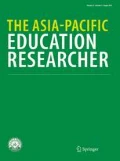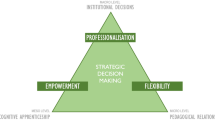Abstract
The purpose of this research was to develop a distant programme of educating parents of primary school children and experimentally check its efficiency in developing educational competencies in parents of primary school children. The study consisted of four consecutive stages: planning, diagnostic experiment, implementing the distant educational programme, and result evaluation. The participants of the research were 37 parents of pupils who went to the first grade of primary school in September 2018. All the participants gave their written consent to participate in the research. The diagnostic stage of the experiment showed that most of the surveyed parents possessed educational competences at a very low level. To provide the parents with pedagogical education, a distant educational course was developed. The course consisted of 12 online classes and lasted for 6 weeks. The online course provided for the parents’ participation in webinars and online conferences. On completing the course, the parents were asked to undergo a control questionnaire survey. The results of the control questioning showed that during the distant course, the parents obtained a sufficient and high level of pedagogical competence. The experiment showed the necessity and rationale for implementing the developed distant educational course for parents with the purpose of developing their pedagogical competence, as well as improving cooperation between teachers, parents and pupils.





Similar content being viewed by others
References
Amponsah, S., Torto, B. A., & Badu-Nyarko, S. K. (2018). Ghanaian mature students’ motivation to pursue degree programmes through distance education. International Review of Education,64, 585. https://doi.org/10.1007/s11159-018-9728-8.
Baltodano, M., & Gomez-Zermeno, M. (2017). Pedagogical, curricular and didactic elements involved in the creation of an e-learning environment: The case of a Costa Rican University. Turkish Online Journal of Distance Education,18(4), 104–119. https://doi.org/10.17718/tojde.340396.
Batiuk, O.V. (2018). Information and methodological materials to assist the workers of psychological service in professional (professional and technical) educational institutions in their work with parents of the risk group students. Lviv 43. (in Ukr.)
Boiarska-Khomenko, A. V. (2018). Ukraine’s implementation of the UNESCO programme on adult learning and education. Zbirnyk naukovykh prats Umanskogo derzhavnogo pedagogichnogo universytetu imeni Pavla Tychyny,1, 27–36. (in Ukr.).
Boronenko, T., Kaisina, A., & Fedotova, V. (2018). Organizing educational institutions networking cooperation through distance learning technologies within regional education system. Turkish Online Journal of Distance Education,19(2), 86–100. https://doi.org/10.17718/tojde.415681.
Boyle, S. (Ed.). (2014). Parents (p. 36). New York: Family and Community. Participation in Inclusive Education.
Ceka, A., & Murati, R. (2016). The role of parents in the education of children. Journal of Education and Practice.,7(5), 61–64.
Cohen, J. W. (1988). Statistical power analysis for the behavioral sciences (2nd ed.). New Jersey: Lawrence Erlbaum Associates.
Dovzhenko, T. O. (2017). Organizing pedagogical education of primary school children’s parents under modern conditions. Teoriya ta metodyka navchannya ta vykhovannya,42, 48–57. (in Ukr.).
Farkas, S., Johnson, J., & Duffett, A. (2003). Rolling up their sleeves: Superintendents and principals talk about what’s needed to fix public schools. New York: Public Agenda.
Hamada, M., & Hassan, M. (2017). An interactive learning environment for information and communication theory. Eurasia Journal of Mathematics Science and Technology Education,13(1), 35–59. https://doi.org/10.12973/eurasia.2017.00603a.
Kamanda, M., Madise, N., & Schnepfc, S. (2016). Does living in a community with more educated mothers enhance children's school attendance? Evidence from Sierra Leone. International Journal of Educational Development.,46, 114–124. https://doi.org/10.1016/j.ijedudev.2015.09.008.
Kremen, V.H., Luhovyy, V.I., Hurzhyy, A.M., & Savchenko, O.Ya. (ed.). (2016). National report on the current state and perspectives of education development in Ukraine. Kyiv Pedagogichna Dumka, p. 448. (in Ukr.).
Kuznetsova, O Yu. (2017). Technological modernization in higher education. Teoriya ta metodyka navchannya ta vykhovannya,43, 185–195. (in Ukr.).
Kyrychenko, V., & Kovhanych, H. (2015). Educating parents at school: What it should be like under modern conditions. Dovidnyk dyrektora shkoly,7–8, 24–35. (in Ukr.).
Law of Ukraine on Education (2017). Electronic resource. Mode of access: https://zakon2.rada.gov.ua/laws/show/2145-19/page. (in Ukr.)
Milenković, Z. M. (2011). Application of Mann-Whitney U test in research of professional training of primary school teachers. Metodički obzori,6(1), 73–79.
National network of partnership schools “Promising Partnership Practices” 1998–2008. Electronic Resource. Mode of access: www.csos.jhu.edu
Nikolenko, L. (2018). Pedagogy of partnership as a condition for implementing the tasks of a child’s personality development in terms of the New Ukrainian School. Metodyst,6, 1–10. (in Ukr.).
Patton, M. Q. (2014). Qualitative evaluation and research methods (4th ed.). London: SAGE.
Priority areas of scientific research of the NAPS of Ukraine for 2018–2022 (2017). Electronic resource. Mode of access: https://naps.gov.ua/ua/press/announcements/1315/. (in Ukr.)
Pufall, E., Eaton, J. W., Nyamukapa, C., Schur, N., Takaruza, A., & Gregson, S. (2016). The relationship between parental education and children’s schooling in a time of economic turmoil: The case of East Zimbabwe, 2001 to 2011. International Journal of Educational Development.,51, 125–134. https://doi.org/10.1016/j.ijedudev.2016.09.003.
Ridey, N. M., Katsero, O.К., & Bashtovyy, V.I. (2018). Conceptual and strategic aspects of reforming the systems of higher and continuous education for sustainable development. Paper presented at the Osvita vprodovzh zhyttya: sotsialni zapyty, suchasni vyklyky ta priorytety v realizatsii, Kyiv. (in Ukr.)
Shtefan, L. A., Yushko, O. V., & Boreyko, N.Yu. (2018). Prevention of children’s and youth’s deviant behaviour in Ukraine: Retrospective analysis. Kharkiv DISA PLUS, 196. (in Ukr.)
Stadnik, N. V. (2013) Cooperation of family and school: Essence, principles, areas and ways of implementation. Paper presented at the Suchasnyy vykhovnyi protses: sutnist ta innovatsiynyy potentsial, Kyiv. (in Ukr.)
The New Ukrainian School. Conceptual principles of secondary school reform. (2016). Kyiv Ministry of Education and Science of Ukraine. 40 p. (in Ukr.)
Tsuei, M., & Hsu, Y. Y. (2019). Validation of classroom teacher interaction skills scale. Asia-Pacific Education Research,28, 457. https://doi.org/10.1007/s40299-019-00447-3.
Tsurkan, T. H. (2014). Pedagogical education of parents. Teoriya pedagogichnogo protsesu,3, 33–37. (in Ukr.).
Warlene, D. & Witherspoon R. (2011) The power of family school community partnerships. A training resource manual. 276 p.
Author information
Authors and Affiliations
Corresponding author
Additional information
Publisher's Note
Springer Nature remains neutral with regard to jurisdictional claims in published maps and institutional affiliations.
Rights and permissions
About this article
Cite this article
Boiarska-Khomenko, A., Liudmyla, S., Valeriia, K. et al. Distant Programme of Developing Educational Competences. Asia-Pacific Edu Res 29, 331–341 (2020). https://doi.org/10.1007/s40299-019-00487-9
Received:
Revised:
Accepted:
Published:
Issue Date:
DOI: https://doi.org/10.1007/s40299-019-00487-9




